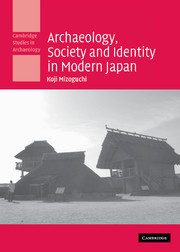Book contents
- Frontmatter
- Contents
- List of figures
- List of tables
- Preface
- 1 Archaeology in the contemporary world
- 2 Modernity and archaeology
- 3 Communication, sociality, and the positionality of archaeology
- 4 Nation-state, circularity and paradox
- 5 Fragmentation, multiculturalism, and beyond
- 6 Conclusion: demands for problematising and explaining one's position all the time
- References
- Index
- CAMBRIDGE STUDIES IN ARCHAEOLOGY
6 - Conclusion: demands for problematising and explaining one's position all the time
Published online by Cambridge University Press: 22 September 2009
- Frontmatter
- Contents
- List of figures
- List of tables
- Preface
- 1 Archaeology in the contemporary world
- 2 Modernity and archaeology
- 3 Communication, sociality, and the positionality of archaeology
- 4 Nation-state, circularity and paradox
- 5 Fragmentation, multiculturalism, and beyond
- 6 Conclusion: demands for problematising and explaining one's position all the time
- References
- Index
- CAMBRIDGE STUDIES IN ARCHAEOLOGY
Summary
Throughout the volume, we have examined the way archaeology as a communication system is situated and reproduced in the functionally differentiated social systems of contemporary society. Modernity, a different name for functionally differentiated social formation, has been in need of sophisticated de-paradoxisation devices, because the intrinsically paradoxical nature of communication, which was previously de-paradoxised by taking for granted the hierarchical ordering of the world in which the god, the king, the monarch, or something of that nature ultimately determined what was good and right and what not, has to be dealt with in one way or the other without referring to/relying upon transcendental value systems. How to de-paradoxise the operation of communication systems, i.e., how to prevent them from stopping their operation because of their indeterminacy, without relying upon their hierarchical configuration, in that sense, has been one of the most significant and determinant themes of life in modernity, and the discipline of archaeology has been mobilised to that end in different ways through time as modernity has matured and transformed. By tracing this co-transformational process of modernity and archaeology, we have revealed the nature of the crisis we are currently in and how it has come about.
This undertaking has made it painfully clear that to seek a way out of this crisis is no simple task.
- Type
- Chapter
- Information
- Archaeology, Society and Identity in Modern Japan , pp. 165 - 169Publisher: Cambridge University PressPrint publication year: 2006



